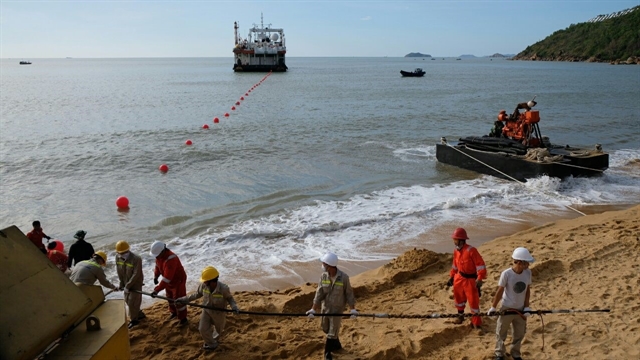.jfif) Opinion
Opinion


|
| Vietnam Internet Association chairman Vũ Hoàng Liên. — Photo baotintuc.vn |
Vũ Hoàng Liên, Chairman of the Vietnam Internet Association, spoke to Tin tức (News) newspaper about the execution of the 2021-2030 plan for information and communications infrastructure with a vision to 2050, and the opportunities for internet development in Việt Nam.
How do you evaluate the information and communications infrastructure planning for 2021-2030 with a vision to 2050?
Planning is of great importance to all sectors. The recent development of the information and communications sector is highly regarded with multiple achievements being seen.
In the future, the information and communications infrastructure will encounter great challenges due to the exponential growth of digital technology and applications. The rights of communities and consumers will increase and change from in the past, in addition to the on-demand customisation in accordance with the location, sector and population.
Therefore, information and communications development planning in the near future will take on a different perspective than before and must stay ahead of the curve in technology and culture.
Internet development also needs to be transformed to respond to the needs of communities, businesses and the people. In the face of the immediate changes, internet planning must be bold in terms of scale, technology and depth. If the criteria in this plan are met, a new dimension will open up for internet development in Việt Nam.
How do you think the plan should be executed to achieve these criteria?
To meet the criteria set out in the plan, I believe that purposeful solutions are of utmost importance. The plan can serve as a landscape, but without specific solutions, the paths will not be clear. An important factor in the plan is demand forecasting, yet the demands in this sector are multi-dimensional, changing rapidly and affected by numerous factors.
The planning must forecast the consumption demands and future fluctuations in alignment with technology and lifestyle trends. In this way, solutions and options can be put forward for implementation. I believe that solutions can engage resources. From the general plan, we can divide it into different categories and sectors.
The indicators in the plan are carefully crafted and achievable, in my opinion. The Ministry of Information and Communications (MIC) acts as the advisor for the plan development, but that doesn’t mean that the plan execution is solely the responsibility of the MIC. That is the collective responsibility of the society, communities and national economy. These goals are achievable, if well-organised.

|
| A new landing station for the cable system was built in the coastal Quy Nhơn City of Bình Định Province. — Photo baochinhphu.vn |
This infrastructure plan set out to develop at least three multi-purpose database clusters at the national level in addition to four to six undersea fibre optic cables. Do you think this goal can sufficiently meet the infrastructure demands for internet development?
It is necessary to increase the number of undersea cables to develop the internet infrastructure in Việt Nam and respond to the enormous demands of the people. Investing in undersea cables is one of the aspects and solutions very worth noting.
This will concern the network capacity, routing, technology used and responsibilities of various stakeholders during operation. I think that for the undersea cable aspect alone, there is a significant need for capacity, much larger than the current level.
As for databases, this will be an important digital infrastructure, especially with the development goals for e-government, digital economy and society. There is potential to build national-level data centres. However, supporting policies are required to determine the role and position of these data hubs.
Data centres need significant investment capital but their potential will be immense. Databases, undersea cable and wireless bandwidth, among others factors, will contribute to an interconnected, comprehensive infrastructure for a digital framework that can meet huge demand in the near future.
Internet development also requires connection with the core of the associated digital infrastructure, which should be developed in parallel with digital applications and content as well as online services.
Therefore, this plan will act as a driving force and attract various stakeholders, while also promoting the country’s digital infrastructure to develop the digital economy and other socio-cultural aspects. — VNS




